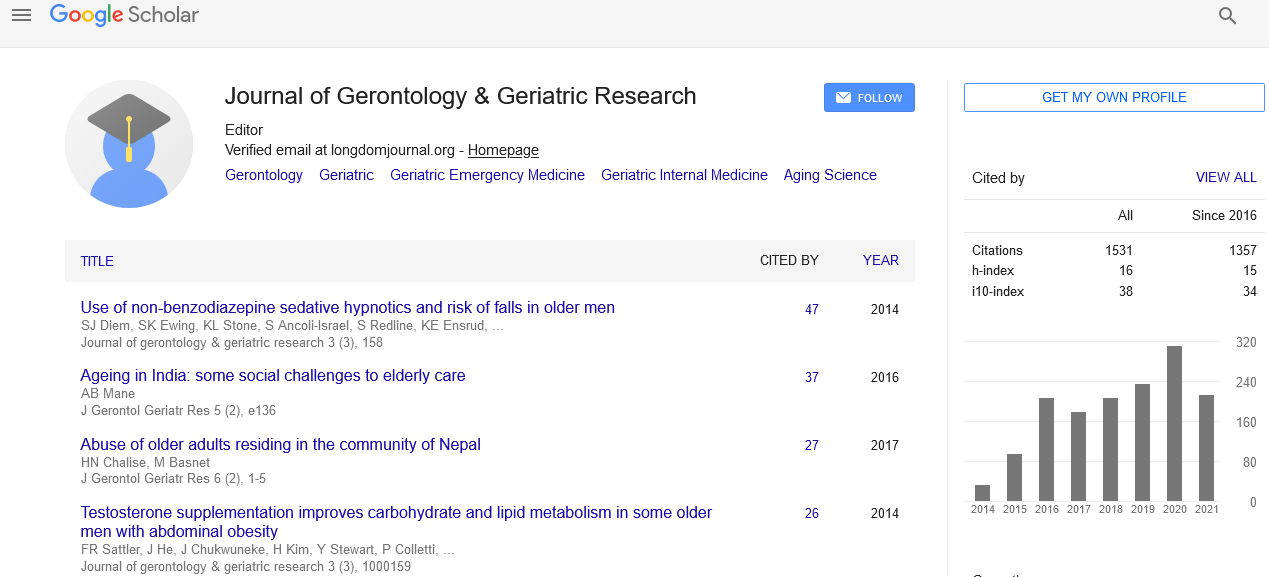PMC/PubMed Indexed Articles
Indexed In
- Open J Gate
- Genamics JournalSeek
- SafetyLit
- RefSeek
- Hamdard University
- EBSCO A-Z
- OCLC- WorldCat
- Publons
- Geneva Foundation for Medical Education and Research
- Euro Pub
- Google Scholar
Useful Links
Share This Page
Journal Flyer

Open Access Journals
- Agri and Aquaculture
- Biochemistry
- Bioinformatics & Systems Biology
- Business & Management
- Chemistry
- Clinical Sciences
- Engineering
- Food & Nutrition
- General Science
- Genetics & Molecular Biology
- Immunology & Microbiology
- Medical Sciences
- Neuroscience & Psychology
- Nursing & Health Care
- Pharmaceutical Sciences
Epigenetic control of ENaC transcription, Na+ metabolism and blood pressure
International Conference on Geriatrics & Gerontology
July 08-10, 2014 DoubleTree by Hilton Hotel Chicago-North Shore Conference Center, USA
Wen zheng Zhang
Scientific Tracks Abstracts: J Gerontol Geriat Res
Abstract:
Aldosterone regulates Na+ reabsorption and blood pressure, largely through the epithelial Na+ channel (ENaC), which consists of α, β, and γ subunits. Defects in ENaC genes cause Liddle?s syndrome and the autosomal recessive form of pseudohypoaldosteronism type 1 (PHA-1). Aldosterone modulates gene transcription by binding to mineralo- and glucocorticoid receptors, which function as ligand-dependent transcription factors. How the ligand-receptor complex gains the accessibility to the packed DNA remains obscure. A novel signaling network regulating αENaC transcription through Dot1amediated histone H3 K79 methylation is identified. Under basal conditions, Dot1a and Af9 form a repression complex, which directly or indirectly binds to the αENaC promoter, leading to targeted histone H3 K79 hypermethylation and repression of αENaC. Aldosterone relieves the repression by reducing expression of Dot1a and Af9 and by impairing Dot1a-Af9 interaction through Sgk1-mediated phosphorylation of Af9. Af17 can also relieve the repression by competing with Af9 for binding Dot1a and facilitating Dot1a nuclear export. Consistently, Af17 knockout mice have increased methylation of histone H3 K79, reduced ENaC function, increased Na+ excretion, and decreased blood pressure. The phenotype can be rescued by inducing high levels of plasma aldosterone through a variety of methods. The clinical relevance of the Dot1a-Af9 pathway in regulating blood pressure is also supported by a recent clinical study. In this study, a polymorphism in DOT1L (rs2269879) could be associated with blood pressure response to hydrochlorothiazide in Caucasians and a polymorphism in AF9 (rs12350051) may be associated with untreated blood pressure in African-Americans.
Biography :
Wen Zheng Zhang is an Associate Professor in the University of Texas Medical School at Houston. He received his PhD from MD Anderson Cancer Center and Postdoctoral training from Howard Hughes Medical Institute, Baylor College of Medicine. His research focuses on epigenetic mechanism of Na+ and water homeostasis, with a special emphasis on histone H3 K79 methyltransferase Dot1l and the epithelial Na+ channel. He created Af17 knockout and Dot1l conditional knockout mice. Recently, he began to study biomarkers and stem cells in kidney injury and repair. He has published more than 40 peer-reviewed papers and received funding from NIH, AHA and ASN.


